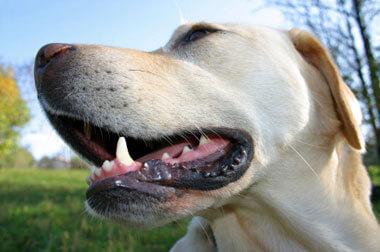
Our pets rely on their teeth for chewing food. People sometimes don’t pay much attention to their pet’s teeth and simply assume their dog or cat will always have his or her teeth. However, pets are susceptible to periodontal disease and other problems with their teeth, and these problems become more common in dogs and cats three years of age and older.
Among the signs that your dog or cat may have dental problems, especially periodontal disease in the gums, are:
- Bad breath
- Gums that are swollen or bleeding
- Yellow or brown discoloration on molars or other teeth
- Excessive drooling
- Tumors on gums or cysts under the tongue
- Loose or missing teeth
Any one of the above is a signal that there may be a more serious problem. A visit to your veterinarian at this point could result in the issue being treated and cured in its early stages with minimal expense. Ignoring the problem could mean more expense later, not to mention a less healthy pet with a shorter life expectancy.
Treating Pet Dental Problems
Tarter and plaque buildup on teeth are one of the main sources of dental problems for your pet. If tartar buildup occurs, a professional teeth cleaning by a veterinarian will be necessary. Removing tartar, tooth extractions, and other oral surgical procedures require that your dog or cat be anesthetized.
As an accredited member of the American Animal Hospital Association (AAHA), we are required to follow a strict anesthetic protocol described on our veterinary surgery page. This is to ensure that the anesthetic procedure is as safe as possible for your pet.
Seven Hills Veterinary Hospital retains the services of Veterinary Specialist Larry Klima, DVM and ADVC board-certified in veterinary dentistry and oral surgery, who is skilled in treating a range of dental problems and diseases of the oral cavity.
